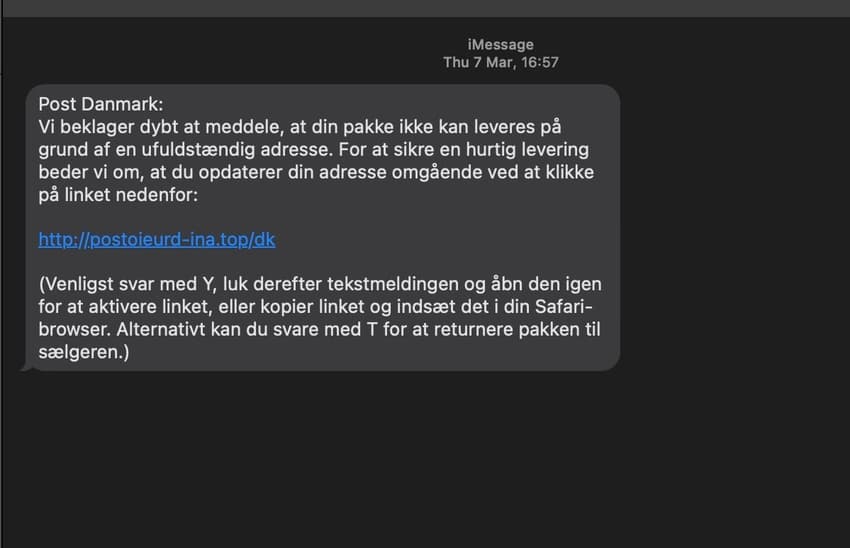Danish SMS scam surge 'does not only target elderly'

Scams involving fake text messages are becoming an increasing nuisance as well as potential cause of financial loss for people in Denmark, new police figures show.
Last year saw the number of SMS scams reported to police in Denmark increase by 130 percent compared to the previous year, a police special unit said in a press statement on Wednesday.
The SMS scams generally work by including a link to a false website, tricking the user into entering personal details such as bank account information.
Once the victim has fallen for the trick of providing personal information, they risk losing thousands of kroner to the scammers.
The text messages can be made to look as if they come from a legitimate sender, according to the police special crime unit NSK (National Enhed for Særlig Kriminalitet).
Scams of this type are classed by police as IT-related crime. Some 35,000 reports were filed in the category last year.
A total of 30 percent more IT related crimes were reported in 2023 compared to 2022, with the scams not limited to SMS, but also increasing in frequency on other platforms.
While ‘phishing’ scams of the type described above are often thought to primarily affect older persons, they are not the only group to suffer, NSK inspector Jesper Kracht said in the press statement.
READ ALSO:
- 'Hang up': Danish police warn against English ‘robot voice’ phone scam
- Foreigners in Denmark targeted by phone scammers
“Many would perhaps be inclined to think that only older people get tricked by the swindle. But that’s not the reality because a lot of young people, adults and businesses can be found in the report data,” Kracht said.
It can often be difficult to see on initial glance whether a text message has been sent by an authority or genuine company.
Kracht said part of the reason the scams have proliferated is that scammers have become “much smarter” and have increased their reach.
Police urge the public to stop and take a time out when asked to provide banking or payment card details, or to log in with the Danish digital ID MitID, when contacted either by SMS, email or telephone.
In all cases, it is best to think carefully or ask someone you trust for advice, police say.
“It’s important to stress that the police, banks and public authorities would never, at any time, ask members of the public to hand over personal information, including [bank] card and [digital ID] MitID information, over the phone or by email or SMS,” the police unit has previously stated.
Comments
See Also
Last year saw the number of SMS scams reported to police in Denmark increase by 130 percent compared to the previous year, a police special unit said in a press statement on Wednesday.
The SMS scams generally work by including a link to a false website, tricking the user into entering personal details such as bank account information.
Once the victim has fallen for the trick of providing personal information, they risk losing thousands of kroner to the scammers.
The text messages can be made to look as if they come from a legitimate sender, according to the police special crime unit NSK (National Enhed for Særlig Kriminalitet).
Scams of this type are classed by police as IT-related crime. Some 35,000 reports were filed in the category last year.
A total of 30 percent more IT related crimes were reported in 2023 compared to 2022, with the scams not limited to SMS, but also increasing in frequency on other platforms.
While ‘phishing’ scams of the type described above are often thought to primarily affect older persons, they are not the only group to suffer, NSK inspector Jesper Kracht said in the press statement.
READ ALSO:
- 'Hang up': Danish police warn against English ‘robot voice’ phone scam
- Foreigners in Denmark targeted by phone scammers
“Many would perhaps be inclined to think that only older people get tricked by the swindle. But that’s not the reality because a lot of young people, adults and businesses can be found in the report data,” Kracht said.
It can often be difficult to see on initial glance whether a text message has been sent by an authority or genuine company.
Kracht said part of the reason the scams have proliferated is that scammers have become “much smarter” and have increased their reach.
Police urge the public to stop and take a time out when asked to provide banking or payment card details, or to log in with the Danish digital ID MitID, when contacted either by SMS, email or telephone.
In all cases, it is best to think carefully or ask someone you trust for advice, police say.
“It’s important to stress that the police, banks and public authorities would never, at any time, ask members of the public to hand over personal information, including [bank] card and [digital ID] MitID information, over the phone or by email or SMS,” the police unit has previously stated.
Join the conversation in our comments section below. Share your own views and experience and if you have a question or suggestion for our journalists then email us at [email protected].
Please keep comments civil, constructive and on topic – and make sure to read our terms of use before getting involved.
Please log in here to leave a comment.